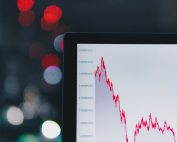Kroger Stock Fair Value – Kroger Stock Range Unaffected by Food Disinflation
December 30, 2023

🌥️Trending News
Their stock is usually traded on the New York Stock Exchange (NYSE). Recently, Kroger ($NYSE:KR)’s stock range has been unaffected by the food disinflation that has been affecting food prices in the US. Food disinflation is a process in which the prices of certain food items, such as meat, dairy and produce, have decreased over time due to a variety of factors. Prices of food have declined because of increased competition from online retailers, more efficient production processes and improved technology. Despite this, Kroger’s stock range has remained steady, with no major fluctuations in price.
This stability in Kroger’s stock range demonstrates that the company has been able to successfully navigate the effects of food disinflation. Their strategies for managing costs and adapting to changing market conditions have helped them to maintain a steady stock range while still providing quality products to their customers. This speaks well to the financial health of the company and bodes well for their future prospects.
Stock Price
On Thursday, Kroger Co. stock opened and closed at $45.2, with a negligible drop of 0.1% from the previous day’s closing price. This suggests that the food retail giant has been able to maintain its stock range on the market despite the current food disinflation environment. While many companies have suffered from the shrinking prices of food products, the Kroger Co. appears to have made the necessary adjustments to remain stable during this period. The company’s ability to manage its stock range through this difficult economic period is a testament to its resilient business strategies. Live Quote…
About the Company
Income Snapshot
Below shows the total revenue, net income and net margin for Kroger. More…
| Total Revenues | Net Income | Net Margin |
| 147.8k | 1.88k | 1.2% |
Cash Flow Snapshot
Below shows the cash from operations, investing and financing for Kroger. More…
| Operations | Investing | Financing |
| 6.03k | -3.57k | -1.65k |
Balance Sheet Snapshot
Below shows the total assets, liabilities and book value per share for Kroger. More…
| Total Assets | Total Liabilities | Book Value Per Share |
| 51.02k | 39.83k | 15.57 |
Key Ratios Snapshot
Some of the financial key ratios for Kroger are shown below. More…
| 3Y Rev Growth | 3Y Operating Profit Growth | Operating Margin |
| 4.2% | -7.7% | 2.0% |
| FCF Margin | ROE | ROA |
| 1.6% | 17.1% | 3.6% |
Analysis – Kroger Stock Fair Value
We have analyzed the company’s financials and have estimated its intrinsic value at around $50.7, based on our proprietary Valuation Line. This means that the stock is currently trading at $45.2, which is undervalued by 10.9%. This presents a good opportunity for investors to benefit from a potential upside in the stock price. We recommend that investors take advantage of the current price and buy the stock. Kroger_Stock_Range_Unaffected_by_Food_Disinflation”>More…

Peers
The Kroger Co is the largest supermarket chain in the United States. It operates 2,800 supermarkets and multi-department stores in 35 states and the District of Columbia under two dozen local banner names including Kroger, City Market, Dillons, Food 4 Less, Fred Meyer, Harris Teeter, Jay C, King Soopers, QFC, Ralphs and Smith’s. Albertsons Companies Inc is the 2nd largest supermarket chain in the United States with 2,200 stores across 34 states and the District of Columbia. Sprouts Farmers Market Inc is the 3rd largest U.S. supermarket chain with 340 stores across 22 states. Grocery Outlet Holding Corp is the 4th largest U.S. supermarket chain with nearly 300 stores across 23 states.
– Albertsons Companies Inc ($NYSE:ACI)
Albertsons Companies Inc is a grocery store chain in the United States. It is the second-largest grocery store chain in the country after Walmart. The company has a market cap of 14.26B as of 2022 and a Return on Equity of 45.75%. Albertsons was founded in 1939 in Boise, Idaho. The company operates stores under the Albertsons, Safeway, Vons, Pavilions, Randalls, Tom Thumb, and Carrs banners. The company also has a pharmacy chain, under the Albertsons Pharmacy banner.
– Sprouts Farmers Market Inc ($NASDAQ:SFM)
Sprouts Farmers Market Inc is a grocery store chain based in the United States. The company offers a variety of fresh and organic produce, meats, and other groceries. As of 2022, Sprouts Farmers Market Inc has a market cap of 3B and a Return on Equity of 21.14%. The company has been growing steadily in recent years, and its strong financial performance is expected to continue in the future.
– Grocery Outlet Holding Corp ($NASDAQ:GO)
Grocery Outlet Holding Corp is a publicly traded company that owns and operates a chain of discount grocery stores. The company was founded in 1946 and is headquartered in Emeryville, California. As of 2022, the company had a market cap of 3.22 billion and a return on equity of 6.43%. The company’s stores offer a wide variety of food and household products at discount prices.
Summary
Investing analysis of Kroger has been showing range bound movement for the past few weeks. This is mainly attributed to the low level of food disinflation rates that have been occurring recently, which has kept the stock from making any significant gains. Analysts are expecting Kroger to remain range-bound in the short-term, however they also see potential for growth in the long-term based on Kroger’s strong strategies and competitive advantages.
Economic conditions, particularly food inflation, will be a major factor in determining the stock’s future performance. Investors should keep an eye on Kroger’s fundamentals and monitor its progress as it continues to develop its products and services.
Recent Posts














